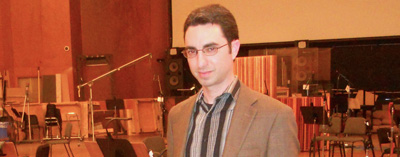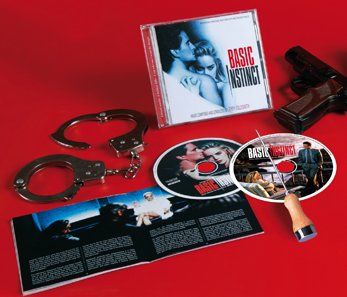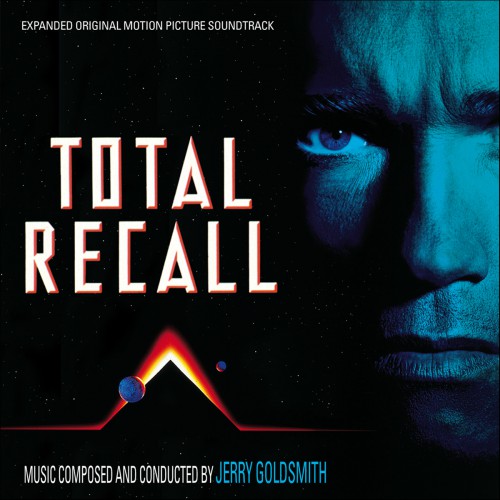|
Spotlight
Articles And Features
THE MAKING OF TOTAL RECALL & BASIC
INSTINCT:
NEIL S. BULK RECALL’S FILM MUSIC WHOLE SALE!
Interview moderated by Amer Zahid

NEIL S. BULK is an independent freelance
soundtrack Producer and Editor; who has lent his talents to various soundtrack
reissues and expansions from such labels as Quartet Records, La-La Land Records,
Film Score Monthly, Varèse Sarabande, Intrada and Walt Disney Records. His most
significant output has been the mammoth 15 CD box set of STAR TREK The Original
Series Soundtrack Collection and the LOST IN SPACE box sets from La La Land
Records. He has recently worked for La-La Land Records as album producer for
GIANT and DANCES WITH WOLVES. In 2015 he collaborated with legendary producer
Bruce Botnick on Jerry Goldsmith’s classic scores for BASIC INSTINCT and TOTAL
RECALL for Quartet Records.
AZ: Neil, Good to have you back for another round here. You are already a
veteran at the US label’s boutique market and last year recently you
collaborated with the Spanish label Quartet Records on two great new projects,
BASIC INSTINCT and TOTAL RECALL . How different is it working with such a label
with such different logistics involved?
NSB: If you read the credits on these releases, you can see it wasn’t all that
different. Johnny Dee Davis did all of the transfers at Precision AudioSonics.
I’ve worked with him for years. Daniel Schweiger wrote the notes for “Basic
Instinct” while Jeff Bond penned “Total Recall”. Again, I’ve known both of them
and worked with both several times in the past. And then I had the opportunity
to work with Bruce Botnick again. We’ve worked on Goldsmith and Disney projects
together, so from that standpoint, it was business as usual.
I think the big difference may have been in the amount of e-mails I sent . As
these were my first projects with Quartet and I was handling much of the
production on this continent, I detailed virtually every step to José M.
Benitez. That way there was no confusion about what these sets were going to be.
Thankfully his vision for these releases mirrored my own and we’re both thrilled
with how they turned out.
AZ: BASIC INSTINCT is one of the most iconic Jerry Goldsmith scores that came
out from his more recent modern oeuvres. To say the least, the film became a
trend setter and redefined the noir film genre for modern audiences. It further
boosted director Paul Verhoeven and upgraded actress Sharon Stone to ‘A’ list
category in Hollywood. The soundtrack has been issued previously by Varèse
Sarabande and expanded by the Prometheus label. It’s considered to be one of
Goldsmith’s most popular and influential scores. How exciting was this
particular project to you when Quartet Records decided to issue this as a
definitive 2 CD set?
NSB: It was very exciting, because I only asked to produce “Total Recall”!
With “Basic Instinct”, I must admit that I wasn’t as familiar with the score as
I should have been, because it is a masterpiece. I owned the Varèse and the
Prometheus releases and enjoyed both. I really didn’t know of a way to
differentiate a new release, because I thought they pretty much covered all of
the bases. Only when I started really diving into the research did I discover
areas where we could deliver something new.
AZ: The previous issues of BASIC INSTINCT were plagued by certain sound
anomalies as in the OST album and also different versions were used in the
expanded set from Prometheus. How were these addressed this time around?
NSB: For whatever reason, there are some sonic issues in the actual recording of
“Basic Instinct”. This is something inherent with the recording, and not
something “wrong” with the Varèse release. I wasn’t aware of this until I
started doing the research for the project. We went back to the original
48-track digital tapes for this release, and on those tapes was the live 3-track
mix (Left, Center, Right) used for the film mix. When I started listening to
those, I heard a minor buzz on the center channel of a few cues. You really have
to be tuned in to hear it.
I did a quick test to see if I could paint it out digitally, and I could, so I
knew it was possible. Then I made a call to Bruce Botnick. This was his
recording after all and he was going to handle the mixdown to stereo. I wanted
to get his permission before proceeding. He gave me some pointers to make sure I
didn’t alter the phase relationship and I came up with my own way to ensure the
cleaned up center channel was identical in time with the left and right channels
and that the buzz would be eliminated.

The Prometheus album is a fine release, but
since it’s only one CD, it can’t possibly have everything on it. By going to two
discs, we were able to offer two versions of “An Unending Story” in an elegant
way, that felt natural, as one ends the film and the other ends the original
album. It also gave us the opportunity to present the versions of cues intended
for the “R” rated US cut.
AZ: Both film score and album version have been entirely remixed and re-mastered
from the original digital multi-track tapes by the original scoring mixer Bruce
Botnick. What was his role on resurrecting the classic scores for BASIC INSTINCT
and TOTAL RECALL?
NSB: I think you just answered your own question. Bruce did the new mix-downs
using his original 3-track LCR mixes for both films as well as the final album
mastering. Most importantly however for both projects, Bruce was instrumental in
locating all of the original multi-track tapes for both movies. If he hadn’t
done that, we wouldn’t be talking right now.
AZ: Well thanks to Bruce! Were there any interesting anecdotes revealed during
reminisces like ‘ oh the day we recorded the live synthesizer’s with the
orchestra and something interesting happened?
NSB: Not that I recall (no pun intended). Bruce and I both agreed the room where
the German sessions for “Total Recall” were held sounded great.
AZ: Moving onto Paul Verhoeven’s action fest bonanza TOTAL RECALL starring
Arnold Schwarzenegger, what was the approach to redo the already satisfying
Deluxe Edition expansion set from Varèse Sarabande? It seemed that certain film
version cues were still missing on that set?
NSB: My usual methodology is to dissect previous releases to learn what was done
on them, but I didn’t do that for “Total Recall”. I realized our album was going
to be long and I couldn’t possibly present every variant (nor would I want to),
so I made the decision to present the score as assembled for the movie on disc 1
knowing we’d present the original 1990 album assemblies on disc 2. There may be
some slightly different takes on the Deluxe versus this new album but I don’t
think anyone will notice.
AZ: TOTAL RECALL has an interesting history of its own. The original sessions
began in Germany with the composer but after a few troubling sessions it was
decided to abort the sessions and move the recording to London with the National
Philharmonic Orchestra. How much of the German sessions music was deemed usable
in the film?
NSB: About 3 minutes worth. The first 2:30 of the main title (“The Dream”) are
from the German sessions and the cue “The Aftermath” is also from those
sessions. That’s it! The main titles were re-used as the end titles, with a
slightly different edit point (“The Dream” has always been a combination of two
performances).
That’s something else I should point out. Goldsmith liked to record complete
takes as much as possible and not intercut between performances. “Basic
Instinct”, for instance, has one cue with an intercut. “Total Recall”, because
of the complexity, has cues made up of many different takes. This is all
detailed in the liner notes of the new release.
AZ: That’s very interesting to know! Also the new set premieres a completely
different approach to the cue ‘Clever Girl’ which to me sounds like a Goldsmith
retro 70’s action pastiche. How did you come about to cut and re-assemble this
cue exclusively for this set and was this most challenging cue to assemble?
NSB: In the case of this cue, you go with what you have. It was the most
interesting thing I heard from the German performances and I knew I wanted it on
the album. The challenge was presenting something that would show the musicians
in the best light possible. We know the sessions didn’t go well, but I didn’t
want to include something that demonstrated that. There were many takes of
“Clever Girl” and I knew that if I cherry picked the best parts of them I could
make something worth listening to. I didn’t have to worry about picture sync, so
I could go to takes deemed unsatisfactory and make it musical. In the end, I
used 7 different performances to put it together.
It wasn’t the most challenging part of “Total Recall”, but it may have been the
most rewarding. Jeff Bond’s notes detail the troubled music history, but with
this set you don’t just read about it and that was important to me.
AZ: So finally we have debuting on this release is the actual film version of
the ‘End Credits’. Was this a re-edit of existing cues put together?
NSB: A friend of mine always asks if I’m going to include the film edited end
titles, and my usual response is “no”. And initially I wasn’t going to do that
for either “Basic Instinct” or “Total Recall”, but then we wound up doing it for
both. In the case of “Instinct” the film used a different take of “The First
Victim” so that became a great way to present an alternate take. In the case of
“Recall” a short bridge was recorded to merge “The Dream” with “The Mutant”
(which are the two cues used for the end titles). When I realized that “The
Dream” was edited differently than at the start of the film and “The Mutant”
ended with a crash not used in the film proper, it became obvious that the end
titles needed to be represented. So in the future, if a film has a tracked end
title, I may be a little more open to including it on a CD.
AZ: That’s great! To say the least, that ‘End Title’ had been quite a mystery
until now. Completing this fine release are the unreleased ‘source cues’ which
fans have always wanted to hear, particularly the spa like ambient
‘Environmental’ cue. Were these recorded after the final sessions or performed
by Goldsmith in his home studio?
NSB: I don’t know when or where they were recorded. They were copied onto the
last reel of the multi-track, along with the source cues by Bruno Louchouarn.
AZ: Both BASIC INSTINCT and TOTAL RECALL appear to be wonderfully re-mastered
but also entirely remixed by Bruce Botnick. The results are absolutely stunning
and they now appear to be definitive representations. How much dependent are we
on technology and how have the tools of technology improved from last ten years?
Are we in a Golden Age of resurrecting and revisiting old recordings and giving
them a new life through technology?
NSB: This is all subjective. Previous releases of these scores derive from the
same mix, but methodologies and techniques are refined. It’s not the technology,
but the people using it. In the case of these albums, we were fortunate to have
Bruce and all of his experience.
AZ: Thank you for your time. It has been very educational. We are also look
forward to more exciting titles as we begin 2016.
NSB: Thanks for the interest! There are some very exciting albums coming from
all of the labels this year!
Special thanks to
Neil S. Bulk
AMER ZAHID is an ardent film music buff by hobby, and a banker by profession.
(Also dabbling as an actor and film maker) He lives in Karachi, Pakistan. John
Williams and Bernard Herrmann remains as his favourite composers to this day,
followed by Jerry Goldsmith, John Barry, James Horner, Danny Elfman and Maurice
Jarre. He has been associated with Film Score Monthly print magazine run by
Lukas Kendall in particular during its early days. His other claim to film music
fame is his involvement with the Grammy Award Nominated ‘The Danny Elfman-Tim
Burton.
The
Total
Recall 2 CD Set And the
Basic Instinct 2 CD Set are available now from Quartet Records!

|